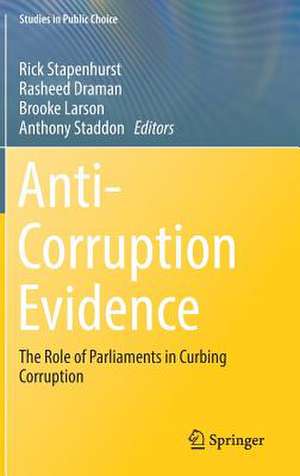Anti-Corruption Evidence: The Role of Parliaments in Curbing Corruption: Studies in Public Choice, cartea 34
Editat de Rick Stapenhurst, Rasheed Draman, Brooke Larson, Anthony Staddonen Limba Engleză Hardback – 15 mai 2019
Din seria Studies in Public Choice
-
 Preț: 542.84 lei
Preț: 542.84 lei - 18%
 Preț: 958.38 lei
Preț: 958.38 lei - 20%
 Preț: 579.92 lei
Preț: 579.92 lei - 18%
 Preț: 780.82 lei
Preț: 780.82 lei -
 Preț: 395.09 lei
Preț: 395.09 lei - 5%
 Preț: 370.58 lei
Preț: 370.58 lei -
 Preț: 381.81 lei
Preț: 381.81 lei - 18%
 Preț: 1228.77 lei
Preț: 1228.77 lei - 15%
 Preț: 637.46 lei
Preț: 637.46 lei - 18%
 Preț: 942.63 lei
Preț: 942.63 lei - 15%
 Preț: 640.71 lei
Preț: 640.71 lei - 15%
 Preț: 633.53 lei
Preț: 633.53 lei - 18%
 Preț: 945.62 lei
Preț: 945.62 lei - 20%
 Preț: 560.55 lei
Preț: 560.55 lei - 18%
 Preț: 947.50 lei
Preț: 947.50 lei - 15%
 Preț: 632.37 lei
Preț: 632.37 lei - 15%
 Preț: 635.15 lei
Preț: 635.15 lei - 15%
 Preț: 634.49 lei
Preț: 634.49 lei - 15%
 Preț: 635.01 lei
Preț: 635.01 lei - 15%
 Preț: 638.89 lei
Preț: 638.89 lei -
 Preț: 381.81 lei
Preț: 381.81 lei - 15%
 Preț: 640.88 lei
Preț: 640.88 lei -
 Preț: 385.62 lei
Preț: 385.62 lei -
 Preț: 393.13 lei
Preț: 393.13 lei - 15%
 Preț: 697.00 lei
Preț: 697.00 lei -
 Preț: 389.31 lei
Preț: 389.31 lei - 15%
 Preț: 643.84 lei
Preț: 643.84 lei - 18%
 Preț: 727.00 lei
Preț: 727.00 lei
Preț: 586.70 lei
Preț vechi: 690.24 lei
-15% Nou
Puncte Express: 880
Preț estimativ în valută:
112.27€ • 120.05$ • 93.60£
112.27€ • 120.05$ • 93.60£
Carte tipărită la comandă
Livrare economică 17 aprilie-01 mai
Preluare comenzi: 021 569.72.76
Specificații
ISBN-13: 9783030141394
ISBN-10: 303014139X
Pagini: 216
Ilustrații: X, 214 p. 38 illus., 9 illus. in color.
Dimensiuni: 155 x 235 x 19 mm
Greutate: 0.49 kg
Ediția:1st ed. 2020
Editura: Springer International Publishing
Colecția Springer
Seria Studies in Public Choice
Locul publicării:Cham, Switzerland
ISBN-10: 303014139X
Pagini: 216
Ilustrații: X, 214 p. 38 illus., 9 illus. in color.
Dimensiuni: 155 x 235 x 19 mm
Greutate: 0.49 kg
Ediția:1st ed. 2020
Editura: Springer International Publishing
Colecția Springer
Seria Studies in Public Choice
Locul publicării:Cham, Switzerland
Cuprins
Introduction: Corruption: Its Causes and Consequences.- Chapter 2: Parliament and Corruption: Theory and Research Design.- Chapter 3: Ghana.- Chapter 4: Nigeria.- Chapter 5: Uganda.- Chapter 6: Tanzania.- Chapter 7: Caribbean.- Chapter 8: Myanmar.- Chapter 9: Oversight and Extractive Industries.- Chapter 10: Oversight and Public Procurement (the Case of Zambia).- Chapter 11: Motivation of MPs: Political Will.- Conclusion: Parliament and Corruption: A Synthesis.
Notă biografică
Frederick Stapenhurst is an Assistant Professor (Professional) at the School of Continuing Studies. He is the principal investigator for four SSHRC-funded research projects, one examining Public Financial Management in Francophone countries, another setting up a global network of parliamentary budget offices, the third examining the demand and supply side of corruption in the mining/extractive sectors in West Africa and the fourth setting up a global network of parliamentary training institutes.. Under his leadership, McGill University, in collaboration with development partners, has launched a university-certified Internationsal Professional Development Program for Parliamentary Staff and a Program for newly elected MPs from small countries
Textul de pe ultima copertă
This book discusses parliamentary oversight and its role in curbing corruption in developing countries. Over the past decade, a growing body of research at the global and regional levels has demonstrated that parliamentary oversight is an important determinant of corruption and that effective oversight of public expenditure is an essential component of national anti-corruption strategies and programs. However, little research has been undertaken at the country level regarding how parliamentary oversight is undertaken, which oversight mechanisms are effective or on how national parliaments interact with other anti-corruption stakeholders. This book presents the results of a new large-scale, quantitative analysis which identifies the mechanisms through which institutional arrangements impact corruption, specifically through country case studies on the Caribbean region, Ghana, Myanmar, Nigeria, Tanzania, and Uganda. Addressing a gap in scholarly knowledge while presenting practical policyadvice for parliaments and for anti-corruption assistance agencies, this book will be of use to scholars interested in development, anti-corruption, public finance, as well as members of parliament, anti-corruption practitioners, and organizations working in parliamentary strengthening.
Caracteristici
Presents new research focused on corruption in the face of parliamentary oversight Analyzes the impact of parliamentary oversight through detailed country studies Provides practical advice for parliaments and anti-corruption assistance agencies such as the World Bank and DFID
